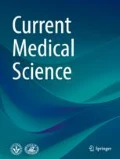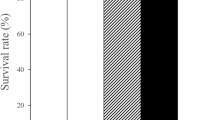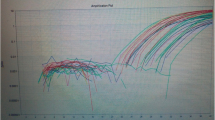Summary
The effects of antisense oligodeoxynucleotide (antisense ODN) to follicle-stimulating hormone receptor (FSHR) and follicle-stimulating bormone (FSH) on the expression of proliferating cell nuclear antigen (PCNA) and vascular endothelial growth factor (VEGF) were studied in primary culture cells derived from human ovarian mucinous cystadenocarcinoma (OMC). The primary OMC cells were cultured with the enzyme digestion method, and the expression of pan Keratin protein and FSHR mRNA was detected for identification of the cells. OMC cells were co-cultured with antisense ODN, nonsense ODN and FSH with different concentrations for 48 h and 72 h. The expression of PCNA and VEGF was detected by using SP immunohistochemistry. Compared with that in the control group, the PCNA and VEGF expression was increased obviously in FSH groups (P<0.05 orP<0.01). while decreased significantly in antisense ODN groups (P<0.05 orP<0.01) and unchanged in nonsense ODN groups, respectively. Meanwhile, antisense ODN could antagonize the increased expression of PCNA and VEGF caused by FSH significantly (P<0.01). It was suggested that FSH might promote the development of OMC to some extent. Antisense ODN could inhibit the proliferative activity of OMC cells and the promoting proliferative activity enhanced by FSH.
Similar content being viewed by others
References
Wang J, Lin L, Parkash V Pet al. Quantitative analysis of follicle-stimulating hormone receptor in ovarian epithelial tumors: a novel approach to explain the field effect of ovarian cancer development in secondary mullerian systems. Int J Cancer, 2003, 103: 328–334
Syed V, Ulinski G, Mok S Cet al. Expression of gonadotropin receptor and growth responses to key reproductive hormones in normal and malignant human ovarian surface epithelial cells. Cancer Res, 2001, 61: 6768–6776
Feng Y J, Zhang X Y, Ge B Qet al. The effects of gonadotrophin on the cell proliferation of ovarian epithelial cancer. Chin J Obstet Gynecol (Chinese), 1996, 3: 166
Li M E, Peng Z L, Zhang P H. The expression and clinical significance of PCNA in ovarian serosity tumors. J Shanxi Med Coll (Chinese), 2002, 4: 101–102
Zhang N. The expression of VEGF and PCNA in ovarian epithelial tumors. J Diag Pathol (Chinese), 2004, 10: 340–342
O'Shaughnessy P J, Dudjey K, Rajapaksha W R. Expression of follicle stimulating hormone-receptor mRNA during gonadal development. Mol Cell Endocrinol, 1996, 125 (122): 169–175
Takahshi H, Strutton GM, Parsons P Cet al. Determination of proliferating fractins in malignant melanomas by anti-PCNA/cyclin monoclonal antibody. Histopathology, 1991, 18: 221
Jiang J, Wang Y, Wang R. The relationship between the expression of PCNA and the prognosis of ovarian epithelial cancer. Chin J Exp Diag (Chinese). 1998, 6: 104–105
Kraemer S, Jaeger W H, Lang N. Growth regulation effects of gonadotropin induced steroidogenic response in human ovarian cancer. Anticancer Res, 2001, 21: 2005–2010
Zheng W, Lu J, Luo Fet al. Ovarian epithelial tumor growth promotion by follicle-stumilating hormone and inhibition of the effect by luteinzing hormone. Gynecol Oncol, 2000, 76: 80–88
Zheng W, Magid M S, Kramer E Eet al. Follicle-stimulating hormone recptor is expressed in human ovarian surface epithelium and fallopian tube. AmJ Pathol, 1996, 148: 47–53
Shen Z, Fang M. The biochemistry characteristics of FSHR and its expression and regulation. Modern J Obstet Gynecol Advanced (Chinese), 2004, 13: 137–139
Zhu C, Wang Y, Nixon M Det al. Antisense oligode-oxynucleotide inhibits expression of recombinant porcine follicle-stimulating hormone receptor. Mol Reprod Dev. 2003, 65: 188–193
Zhu C, Xiong Z, Xiao H. The effects of antisense oligodeoxynucleotide on the expression of recombinant porcine follicle-stimulating hormone receptor. National J Androl (Chinesc), 2000, 3: 146–149
Author information
Authors and Affiliations
Additional information
LI Shuang, female, born in 1971. Doctor in charge
Rights and permissions
About this article
Cite this article
Shuang, L., Hefang, L., Ling, W. et al. Effects of antisense oligodeoxynucleotide to follicle-stimulating hormone receptor on the expression of proliferating cell nuclear antigen and vascular endothelial growth factor in primary culture cells derived from human ovarian mucinous cystadenocarcinoma. J. Huazhong Univ. Sci. Technol. [Med. Sci.] 26, 111–115 (2006). https://doi.org/10.1007/BF02828054
Received:
Issue Date:
DOI: https://doi.org/10.1007/BF02828054




